Menu
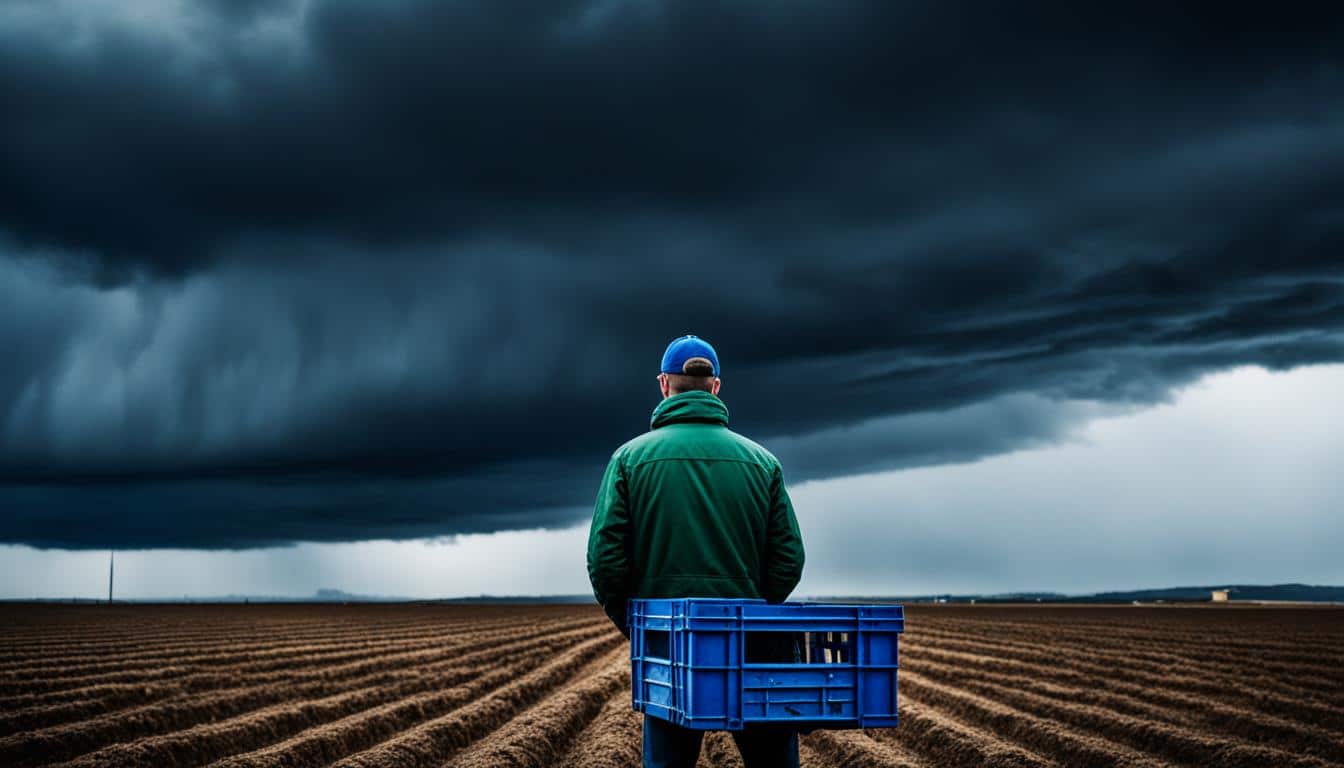
Did you know the UK has a ‘just in time’ food system with groceries for only 5 to 10 days? This fact shows how vulnerable our farming is post-Brexit. For almost 50 years, the EU and UK food systems have been closely tied.
Now, the UK’s farming future is at a turning point because of Brexit. The rules and trade deals we make will really matter. The Environment Secretary, Michael Gove, highlighted the need to balance different viewpoints.
I believe dealing with Brexit’s impact on farming needs a deep understanding. It affects our environment, our economy, and the way our politics work. Issues like different food standards and how much farm land gets used are just starting points.
Farming uses a lot of the UK’s land, so it’s a big deal. Post-Brexit, the government must keep food and environment standards high. There’s also a chance to change laws for better health, showing we care about everyone’s wellbeing.
The delayed border checks and new food rules will make things harder for our food system. We have to adjust to these changes for our farming to do well.
The impact of Brexit on farming has sparked many conversations and studies. Especially farmers are discussing the effects. In this article, I’ll talk about my experiences and views on the challenges facing farming. I’ll look at how Brexit has changed things for the UK’s farming industry.
I come from a family of farmers, spanning back four generations. We’ve seen how UK farming has evolved. From the days before the Common Agricultural Policy (CAP) to the changes post-Brexit, the industry has altered significantly. My childhood in rural England was deeply connected to farming. It’s not just work for us; it’s our heritage.
The CAP from the EU helped us financially. But, Brexit has meant a future without that support, around €4 billion each year. Also, up to 95% of our sheep meat goes to EU markets. So, the impact on local farmers is immense.
Brexit doesn’t just affect the money in farming. It changes how we trade, the rules we follow, and who works in the fields. Nearly three quarters of the UK’s land is farmed. This makes farming key to our economy and traditions. The payments we get, often more than half of what a farm earns, are critical for our farms.
The changes could lead to problems in trading, possible tariffs, and less farm workers. This reveals the need for strong support and new ways to work. Exploring these issues aims to show what it’s like for farmers today. This understanding helps see the impact on everyone’s food and money.
Since the Brexit referendum, the UK’s agricultural sector has been hit hard. There have been big changes in the economy and politics. This has made farming a tough game, leaving many farmers unsure and finding new ways to work.
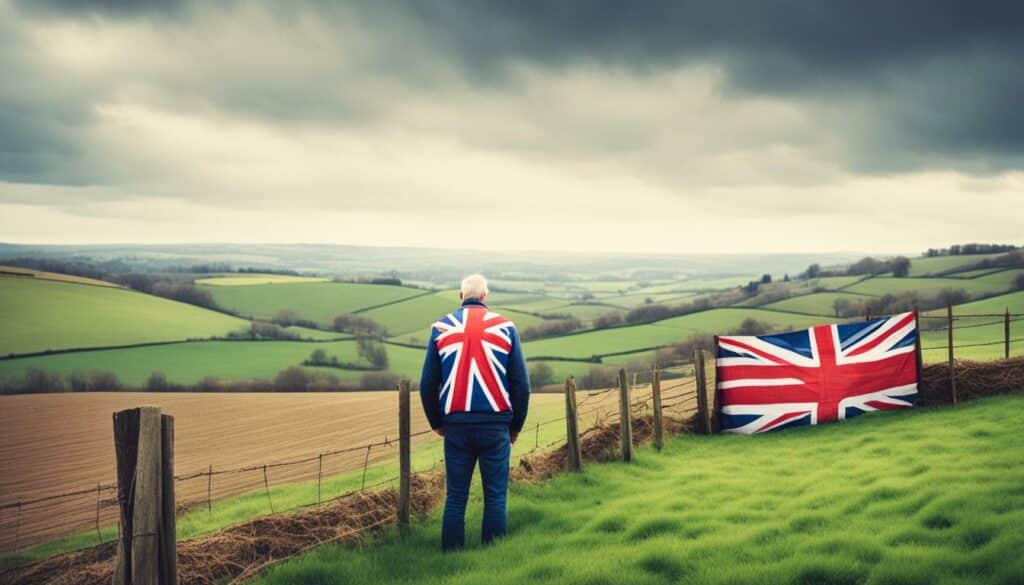
The economy of farming after Brexit has changed a lot. In a survey, 75% said Brexit hurt the UK’s economy. 69% said their farms were also negatively impacted.
Arable farmers especially feel the pinch. A large number believe Brexit has hurt their operations. This feeling is also shared by oilseed rape and livestock farmers. One big issue is the cost of inputs which are rising. High energy prices add to their worries.
The table below shows how different farming sectors view Brexit’s impact:
| Farming Sector | Percentage with Negative Perception |
|---|---|
| Arable Farmers | 70% |
| Oilseed Rape Growers | 76% |
| Livestock Farmers | 68% |
| Vegetable Growers | 81% |
| Pig Farmers | 79% |
The fallout from Brexit is made worse by more complex bureaucracy. 58% say the paperwork has gotten much harder. Also, 90% in related sectors feel these new bureaucratic pains. The cost of farming has risen by nearly 50% since 2019, with UK egg production reaching its lowest in nine years.
The political scene is also changed by Brexit. The impact on UK farmers is huge. 65% say they’re now less likely to vote Conservative. 53% think Brexit has made devolution more appealing.
Even some who backed Brexit are unhappy. Around 36% of them see the negative effect on their businesses. Post-Brexit trade deals are not well-received. 31% say they are bad for British farming, and 48% say they are very bad.
There’s a big issue with not enough workers, made worse after Brexit. This led to £22 million of produce not being picked in 2022. High energy costs are another strain on pig and horticulture farms. This shows a big shake-up in farming’s economic and political scene.
So, it’s vital to tackle Brexit farming challenges with joint political and economic plans. This is key to the UK farming industry’s health and future success.
Brexit has brought big changes to farming. It has hit market access and the availability of workers hard. This has created tough times for farmers after Brexit.
It is now harder to get into markets after Brexit. British farmers used to get big subsidies from the EU, nearly £3 billion each year. This was up to 90% of some farmers’ incomes. But, after Brexit, these payments stopped. Now, new trade barriers and lots of paperwork make selling goods abroad tough. This leads to delays and more costs for farmers. It also affects how well they can compete.
Defra aims to have 70% of farmers join environmental schemes by 2028, but only 11,000 are in it. This move shows a push towards eco-friendliness. Yet, it’s not easy, especially for older farmers who may not be tech-savvy. More than 40% of UK farmers are over 65. For them, dealing with new rules can be too much. This might lead to the closure of farms and a loss of valuable experience.
Lack of workers in farming has become a big issue due to Brexit. Before, most seasonal workers came from Eastern Europe, mainly Bulgaria and Romania. But, with Brexit, getting visas is harder. Now, only a very small percentage of these workers have British nationality. This has badly affected farm work. Crops are left unpicked, and it costs more to get the work done.
The COVID-19 pandemic has made the worker situation even worse. It caused big problems and supply chain issues. It showed the need for better strategies for the future. Even with all the challenges, there is a need for technology to keep food production safe. British farming aims to meet the growing demand for quality food. It does this while sticking to eco-friendly practices consumers want.
Solving the problems with market access post-Brexit needs careful planning and a lot of investment. At the same time, dealing with the lack of workers asks for changes in how we get workers and do recruiting.
The UK’s farming world is changing post-Brexit. There are new rules and trade deals in place. Farmers and people in farming areas need to understand these changes. This will help them know the impacts of Brexit on their work.
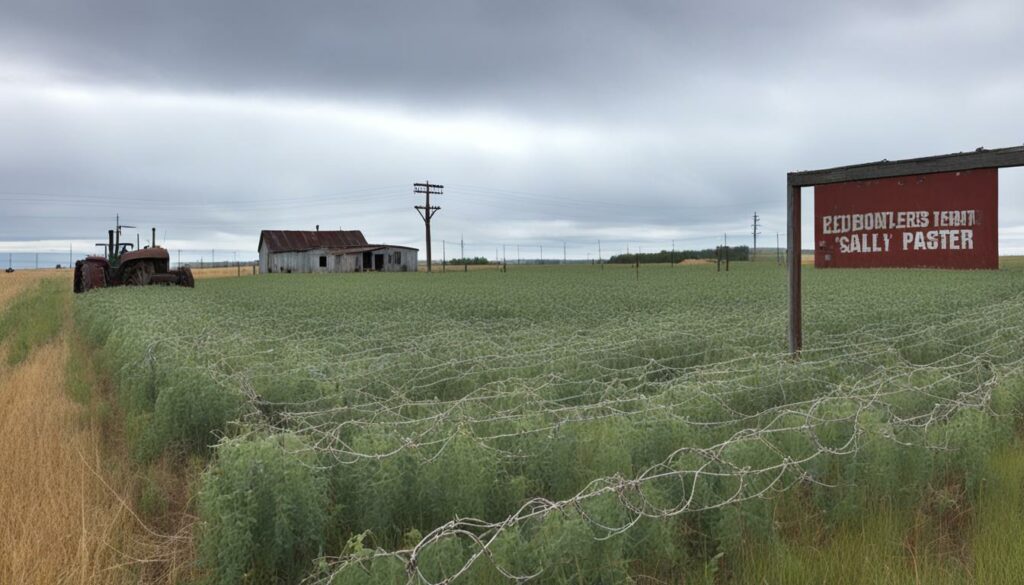
Since Brexit, the UK has its own farming rules. These are different from the EU’s rules. The farming sector in the UK got a lot of money from the EU before. But now, the way this support works is changing.
A new body will also make sure environmental rules are followed. These rules need to match or be even better than the EU’s.
Trade and tariffs have also changed after Brexit. In 2020, the UK bought £75.5 billion in farming goods but sold only £30.5 billion. These changes affect the costs of items coming in and how well UK products can compete abroad.
The UK’s trading with the U.S. in farming has been worth £2.7 billion. But Brexit has brought new barriers to trade. The worry is about bad quality food coming into the UK. This could make UK farming standards drop.
| Year | UK Imports (in billions) | UK Exports (in billions) |
|---|---|---|
| 2020 | $75.5 | $30.5 |
After Brexit, UK farmers face both new challenges and opportunities. They are free to make their own trade deals, not bound by EU rules. This brings new chances but also means they must work harder to stand out globally.
The UK can now make its own trade deals outside the EU. This is seen clearly in the lamb market. If China puts a 25% tariff on lamb from New Zealand, UK imports could rise by 13,000 tonnes. With a ban, they could go up by 29,000 tonnes. These numbers show a big opportunity for UK farmers to reach new markets.
With surging energy prices, finding cost-effective solutions is crucial for farmers. For instance, the need for costly export health certificates in 2021 increased food export costs to Europe by £60m. This pushes farmers to look for savings and new methods.
Yet, there is also more competition ahead. It now costs more to sell to the EU, which takes a big part of the lamb market. UK farmers must now compete with others worldwide in terms of both price and quality. Moreover, the cuts in subsidies are tough for 42% of UK farms reliant on them. This makes it harder to stay profitable against global rivals.
The table below shows key figures summarising the challenges and opportunities farmers face:
| Statistic | Data |
|---|---|
| Increase in New Zealand lamb exports to the UK (25% China tariff) | 13,000 tonnes (31%) |
| Increase in New Zealand lamb exports to the UK (ban by China) | 29,000 tonnes (69%) |
| Additional cost due to new export health certificates in Europe | £60m in 2021 |
| Income increase in “less favoured areas” for cattle and sheep farming | 32% to £29,900 (2020-21) |
| Subsidy dependency for UK farms to remain profitable | 42% |
Facing these UK farmers trade deals needs smart responses. Adapting and staying strong is critical. In the end, the UK’s farming industry must grab these opportunities to ensure its future success and growth.
The world of agricultural subsidies post-Brexit has changed a lot. The EU’s support, known as the Common Agricultural Policy (CAP), was almost £3 billion a year for UK farmers. This was up to 90% of their income. Now, the UK is moving away from the CAP. This change will be complete by 2028, and the UK is creating its own system of support.
There are many hurdles to overcome in this new system. Payments from the Sustainable Farming Initiative (SFI) in 2023 were lower than before, according to reports. In fact, farmers only received a third of what they used to under the EU. And, it’s estimated that by 2024, payments will still be 50-70% less than in 2020 using the Basic Payment Scheme.
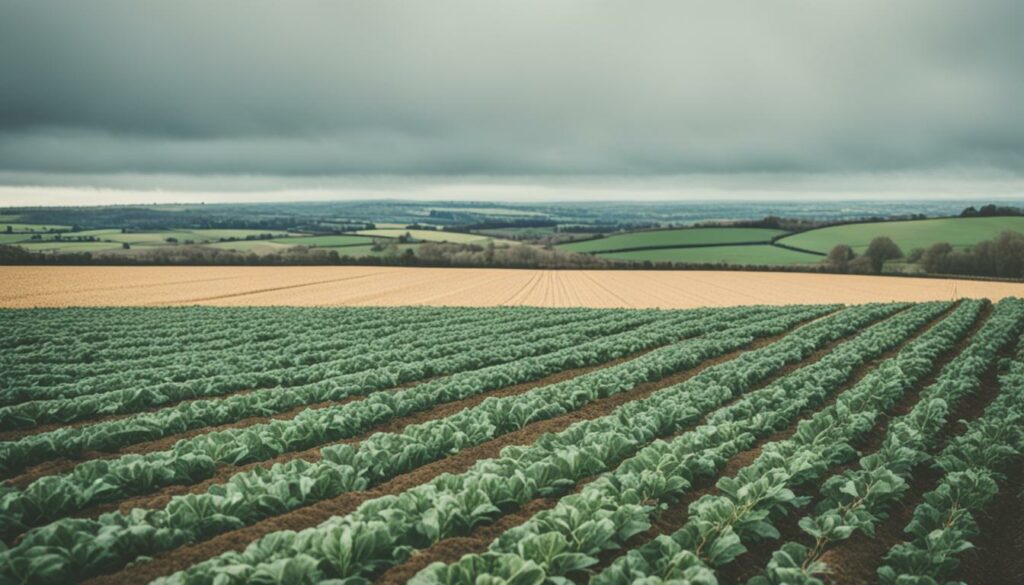
The UK government, through Defra, is pushing hard to get farmers on board with the new schemes. By 2028, they want 70% of farmers to be part of environmental land management. Already, 11,000 English farmers are taking part. The heart of this change is the Environmental Land Management (ELM) scheme. This scheme pays farmers for creating environmental benefits, like planting hedges and improving water and air quality.
Moving from CAP to ELM also brings educational challenges. Some farmers find it hard to use the 150-page “Sustainable Farming Incentive” document because they’re not used to so much technology. There’s a real need for the government to support farmers and help them understand the new Brexit farming policy.
There’s another challenge with the age of UK farmers. Over 40% are over 65. This could lead to a loss of traditional farming skills and ways of life. The worry is that as policies change, important cultural practices may be forgotten.
The financial effects of all these changes are serious. For example, arable farmer James Peck lost £600,000 over two years due to cuts in Basic Payments. It shows how challenging it can be to make up this money with new schemes. This highlights the need for strong, well-funded support to keep the UK farm sector healthy.
| Metric | Pre-Brexit | Post-Brexit Projections |
|---|---|---|
| Annual EU Subsidies | £3 billion | £0 by 2027 |
| Income Dependency on CAP | 90% | N/A |
| Farmer Participation in ELM (Projected by 2028) | N/A | 70% |
Discussions at the Oxford Farming Conference also looked at the big challenges of supermarkets and supply chains. It’s clear that a solid Brexit farming policy is needed. The Secretary of State for the Environment, Food, and Rural Affairs announced a 10% increase in SFI funding to help out.
The new subsidy system is about more than just the environment. It’s about careful planning too. The success of British farmers in this change relies on support and measures that fit the new post-Brexit reality.
The UK leaving the EU has led to big changes in farming regulations UK-EU. There’s a new mix of rules and chances for the future. UK farmers are working hard to follow new rules for selling food to Europe and dealing with Brexit’s rules.
After Brexit, UK farmers are dealing with lots of new rules. Before, they followed the EU’s rules closely. Now, they have to keep up with UK-specific changes and face issues like less EU help than other farmers get.
There’s also less money to help UK farmers and inflation is rising. Plus, selling food to the EU hasn’t been easy since Brexit. All this makes following the rules harder and very important.
| Region | Policy Approach | Focus |
|---|---|---|
| England | Environmental Land Management Programme (ELMS) | Public goods payments |
| Scotland | High-quality food production | Environmental sustainability and climate change mitigation |
| Wales | Stronger environmental conditions | Direct payments |
| Northern Ireland | Food production | Less emphasis on environmental aspects |
The future of farming regulations UK-EU will see both steady and changing things. England and Wales are moving away from EU rules by slowly stopping direct payments. Scotland and Northern Ireland are keeping some EU ways, highlighting how different parts of the UK view Brexit’s impact.
Northern Ireland will still follow some EU laws because of the Protocol. This means their rules might show the rest of the UK how to be more flexible. But, as the UK makes new trade deals and decides its own farming rules, working together is key. This includes farmers, groups, and the government, to deal with the changing situation.
Brexit has made the agricultural import and export scene more complicated. It has greatly affected supply chains and trade relationships. This has led to a need to rethink many parts of the agricultural world, such as how we do things logistically, economically, and legally.
Brexit has really hit the agricultural import scene hard. Just to give you an idea, the U.K. brought in $75.5 billion worth of agricultural goods in 2020. But it only managed to export $30.5 billion. This huge difference shows the struggle exporters face post-Brexit, hurting market dynamics and the economy.
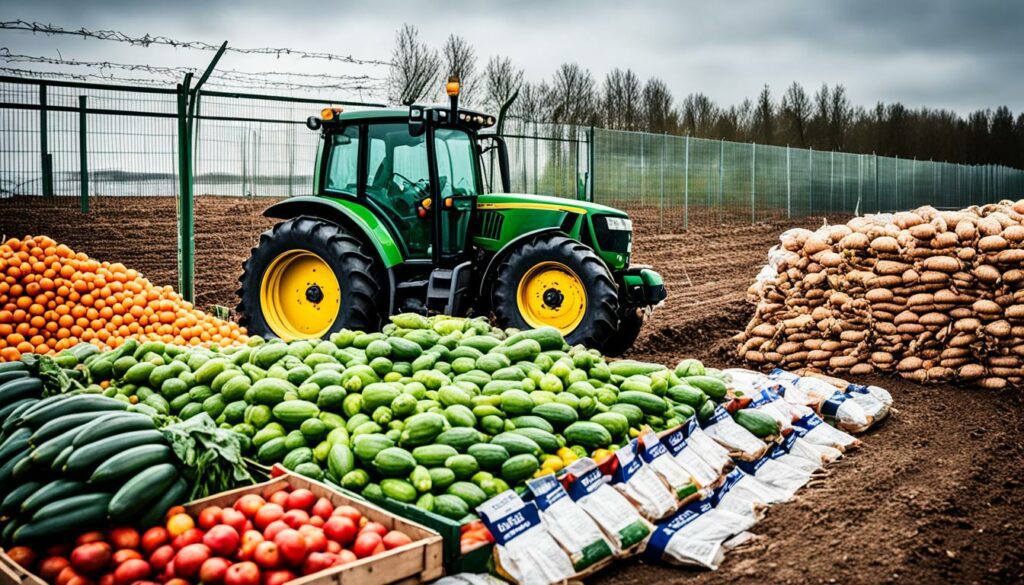
In 2020, the U.K.’s farming output value was $34.2 billion. A big part of that was products from livestock, worth $19.3 billion. Keeping supply chains running smoothly has become a big challenge. People have had to adapt to new customs rules. This has made things more expensive and raised the chances of disruptions in the farming supply chain.
After Brexit, the U.K.’s trading friends have changed a lot. Before, 43% of what the U.K. sold went to the EU. And over 70% of what it bought came from there. But things are different now. The U.K. has begun to trade more with countries outside the EU, like the U.S. and Brazil. This is clear from the increase in goods such as forest materials and essential oils.
The U.S. is a good example of a new trade partner. In 2020, it sold $2.7 billion worth of goods to the U.K. This included forest products, beverages, and fresh vegetables. The change to using biomass in power stations has made the U.S. a main supplier of wood pellets to the U.K. This shift in trade partnerships brings new chances but also faces challenges, like not having the same food safety rules and farming methods.
So, Brexit has surely made the agricultural trade scene more complex. It has opened up new markets. But it also needs the industry to find new ways to adapt and overcome challenges. Looking ahead, I see a future full of hope for U.K. farming and trade.
The UK has made a big change after leaving the European Union in terms of farming. This change impacts how farming is done in the UK. It looks at laws that affect farming and what this means for farmers in the UK.
While in the EU, the UK followed the Common Agricultural Policy. Now, the UK makes its own rules for farming. The new plan in England and Wales stops direct payments to farmers. Instead, they support environmental and farming schemes. By 2028, this change should be complete.
But, Scotland and Northern Ireland will still give direct payments. Northern Ireland must keep up with the EU’s updates on farming laws. This shows how the UK’s parts are handling farming rules differently.
These changes are tough on farmers. They get less help, so they have to spend carefully. With less money to run their farms, many are struggling. They need to change how they work to survive.
One big problem is that UK farmers can’t compete with EU ones. Exporting products is more expensive now. New trade deals could make this even harder. So, the pressure from overseas farms is growing.
There’s also the issue of different standards in farming between Northern Ireland and the UK. This could split up the UK’s market. It’s important for the UK to come up with plans that help all its farmers equally.
| Region | Policy Approach | Practical Implications |
|---|---|---|
| England and Wales | Phasing out direct payments | Shift towards environmental schemes, reduced farm incomes |
| Scotland and Northern Ireland | Retaining some direct payments | Maintained support levels but risks from EU regulatory changes |
The decisions made now will affect how strong and lasting the UK farm industry is. They will adjust to new ways of farming to keep going.
After Brexit, UK farming faces new directions. Support systems will change. The goal is to keep the land healthy and the business stable.
Without EU help, UK farms lose about £3 billion a year. This hits hard financially, especially for small farms. They might find it hard to stay green without that support. Defra wants many farmers to join environment-friendly schemes by 2028. Right now, over 11,000 farmers in England are in. This shows how important being eco-friendly is, with much of the UK’s water in bad shape. We must act quickly to stop farm pollution.
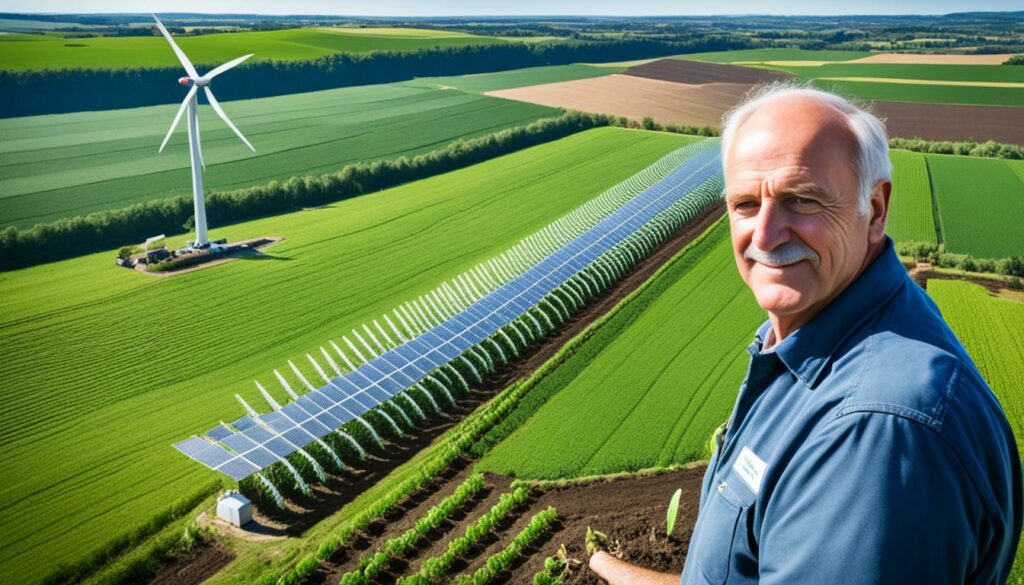
The UK aims to cut all harmful emissions by 2050. This shows a big push for green farming. Methods like Integrated Farm Management, advised by LEAF, really help. They focus on healthy soil and lots of plant and animal life. This draws carbon from the air, supports wildlife, and lowers harmful gases.
People want food grown the right way. That’s why schemes like LEAF Marque are becoming more popular. Many in the food industry support these eco-friendly efforts. Yet, we need to show everyone the good that green farming does. It’s not just for nature but for our own pocket and community too.
To go green after Brexit, UK farming needs solid support in place. It’s about helping farmers understand the new rules and still thrive. Balancing farm’s future, environmental needs and good green rules is crucial. We must protect our farming traditions for a strong tomorrow.
While looking at supermarket shelves recently, I noticed something strange. There seemed to be less fresh fruit and veg, like tomatoes and peppers. This drop in supply is due to a mix of reasons, including Brexit and bad weather. These problems are making it harder for us to get the food we need.
The impact of Brexit on supermarkets is big. Many are now limiting how much fruit and veg each person can buy to manage shortages. For example, Tesco is only allowing three items per person. Asda and Morrisons are doing the same, showing how widespread the problem is.
Since the pandemic started in 2020, food supply issues have been ongoing. The current shortages also point to Brexit being a major cause. The way the government is dealing with food supply has drawn a lot of criticism, with many questions being raised.
Markets and farmers are worried. They want fast action to keep our food chain strong. They fear that new deals with other countries might flood the UK with cheaper goods, hurting British farmers.
This problem is part of a bigger, global issue. It’s not just about Brexit. Climate changes and tensions between countries are also playing a part. For example, in winter, the UK relies mostly on imports for its fresh food.
“The shortages we are experiencing are largely down to a multitude of factors including Brexit, which cannot be ignored. Urgent action is needed to alleviate these supply chain challenges and ensure food security for our nation.” – Liz Webster, Save British Farming
Here’s a look at how different supermarkets are handling the situation:
| Supermarket | Restrictions Implemented |
|---|---|
| Tesco | Limit of three items per customer on tomatoes, peppers, and cucumbers |
| Asda | Three items per shopper on eight fresh produce lines including broccoli and lettuces |
| Morrisons | Limit of two items per shopper on packs of tomatoes, cucumbers, lettuce, and peppers |
Facing the issue of fresh produce needs help from the government and farmers. Using new technology in farming could really make a difference. With the right support and policies, we can keep our food chain strong post-Brexit.
After Brexit, the UK’s farming sector faces big hurdles. These come from new visa rules and job finding issues. These big changes hit the industry hard, especially with not enough workers for the seasons.
The EU’s freedom of movement used to mean UK farms got great help from immigrant workers. Since Brexit, new visa rules have made things difficult. Despite efforts from Prime Minister Boris Johnson to ease job rules, fewer immigrants work in farming.
Agriculture has always needed seasonal workers. Now, with fewer to pick from, the problem is severe. The strict visa rules after Brexit mean farms can’t hire many short-term workers from outside the UK. This has caused a major lack of labour.
Before January 2020, there was already a big drop in farm workers. This hit especially hard in the food supply chain. By late 2020, more recruitment issues came up as many older workers chose to leave early. Their numbers doubled compared to before.
After the economy started again, the food sector had a lot of job openings. Q2 of 2022 saw a 6.3% vacancy rate. But the agriculture field still struggles to find workers. Surveys found less than 5% of UK people want to work on dairy farms.
This situation leads to crops being left unharvested. It also causes labour costs to rise. Combined with more expenses after Brexit, the prices of local foods go up. To improve, the field must offer better perks to workers to fill these gaps. This will help make it more self-reliant.
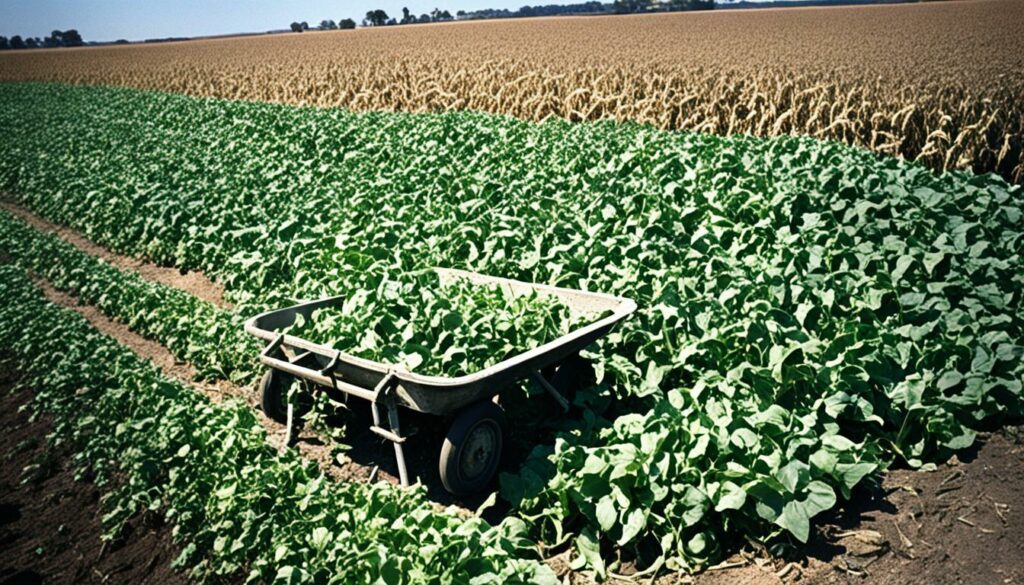
The problems in meat processing highlight the recruitment issues. High rates of empty jobs, especially for veterinarians, butchers, and meat processors, show how tough it is. There’s a 15% missing workforce in a sector with 97,000 direct jobs. This makes it hard to find and keep workers due to rising costs.
To fix the labour shortage and recruitment struggles, we need to offer better perks. We also need strong local support and smart planning in the farm sector.
British agriculture faces big economic challenges after Brexit which shake the idea of fair economics for farmers. Factors like prices for their products and production expenses significantly impact their profits after Brexit.
Farmers struggle a lot due to pricing issues in agriculture. The costs of things like seeds, fertilizers, and fuel keep changing, adding more stress. The problem is, the prices farmers get for their produce don’t always cover the true cost of making them. This leaves farmers in a tough spot with unstable profits.
After Brexit, it’s been hard for farmers to keep their profits healthy. They have to deal with different trade rules and more competition, which requires constant innovation. But, they also face higher costs to follow new regulations and meet export requirements. Although exports have gone up, the added expenses and unpredictable markets often cancel out any benefits.
Notable Statistics:
These stats show the difficult situation farmers are in after Brexit. Although the general economy is growing and exports are up, the farming sector needs specific help to ensure fairness for farmers.
Since Brexit, the UK government is helping farmers a lot. They give money and teach new skills to deal with changes. This aims to keep the farming sector strong and growing.
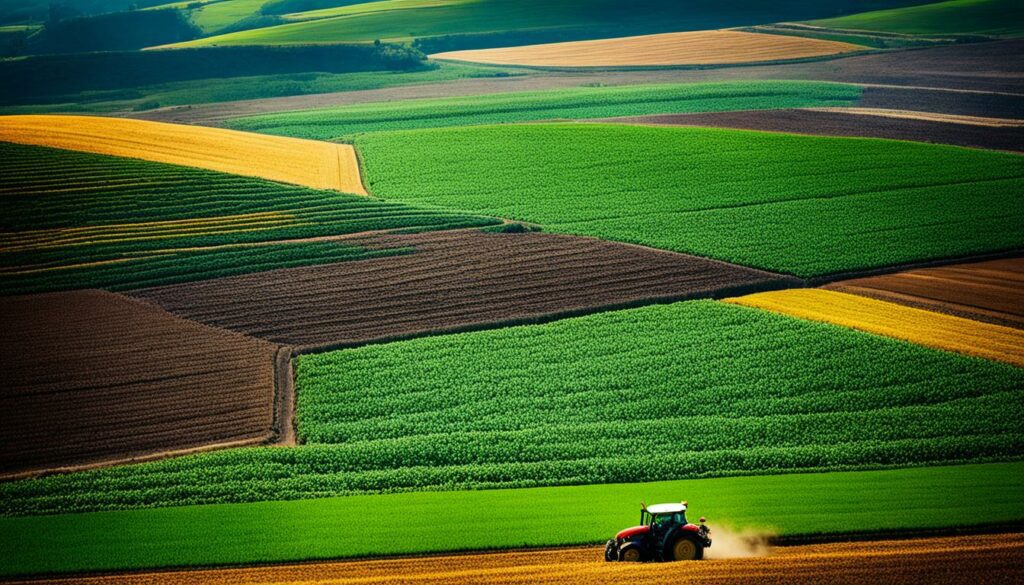
The government supports farmers with money. Before Brexit, the EU gave $46.5 billion from 2010 to 2019. Now, the UK gives new support, like money for bird nests and protecting rivers.
Farmers can start getting this support in the summer. This helps them even without EU support.
The UK also helps farmers learn new things. They teach farmers about the latest technology and farming methods. This training is important so farmers can keep up with changes and rules.
| Financial Support | Details |
|---|---|
| Subsidies from EU CAP | $46.5 billion between 2010-2019 |
| New Post-Brexit Subsidies | GBP765 per hectare for lapwing nesting plots, GBP1,242 per hectare for connecting habitats |
The face of British farming is changing a lot due to new post-Brexit technologies. These include things like precision agriculture and digital tools. They aim to make farming more efficient and kinder to the planet.
Precision agriculture is changing how farmers look after their land and animals. Satellite imagery, drones, and sensors help farmers track their fields closely. They do this in real-time.
This lets them make small, focused changes to get more crops with fewer waste. It’s good for the planet, too. Nearly 70% of farmers think going greener will help them compete better after Brexit. That’s why Barclays is putting £250m towards becoming carbon neutral.
Digital tools are also making a big difference on farms. They gather and use lots of data to make farming smarter. For example, there are many more job applications for roles that mix technology and farming.
Barclays is working with the University of Lincoln to help make UK farming the most digital in the world. This will boost efficiency and sustainability. It’s all part of the push towards a greener future.
83% of farmers think they could be carbon neutral by 2035. This is earlier than the 2040 target that’s been set. Digital tools are key to hitting this goal. They help make farming much more precise and efficient.
This is crucial for the future success of British farming. Post-Brexit, these advancements will keep farming competitive and good for the environment.
| Key Indicators | Statistics |
|---|---|
| Farmers seeking new technology investments | Two-thirds |
| Target for carbon neutrality by NFU | 2040 |
| Believe they can hit carbon neutrality by 2035 | 83% |
| Expect increase in agricultural technology | Next 10 years |
In the post-Brexit world, these new farming technologies will be vital. They will play a huge part in shaping the future of UK agriculture.
As I look back at the challenges Brexit has brought to farming, the UK’s farming sector is changing a lot. This change is from economic shifts and market dynamics to new rules. Farmers face many new challenges. Strong government help and smart policies are key to stand strong.
For example, with China raising tariffs, New Zealand may sell more farm products to the UK. This shows how markets are changing worldwide. In the UK, we see farmers raising more cattle and sheep in tough areas. This shows how farmers can adapt.
But, they also face big problems like fewer subsidies after Brexit. This could mean a big loss of money for many farms in Wales and Scotland. The loss could be around 225 million pounds in Wales and 93 million in Scotland.
To face these changes, farmers should think ahead. Joining schemes like the Countryside Stewardship has increased by 90% since Brexit. Looking for new trade chances beyond the EU is crucial. But, issues like lack of workers and tougher trade rules are hard to ignore.
The UK Internal Market is very important, especially if there’s No Deal Brexit. When people start buying more local products, this market is key. There are challenges, but also chances to grow stronger in the end.
In the end, Brexit is making life hard for UK farming. But, it’s also a time to rethink and grow smart. By facing challenges head-on and looking for new ways to do things, UK farming can come out stronger. This can lead to a better and more stable future for UK farming.
UK farmers are dealing with several big hurdles after Brexit. They find it hard to get into markets abroad. This is because there are more trade barriers and they face lots of new red tape.
Another major issue is the shortage of workers they normally hire for farming. The rules have shifted, and it’s harder to bring in seasonal workers. Farmers must also get used to new rules and taxes for trading.
Since Brexit, there have been big changes in agriculture’s money flow. Exports have gone up. Farmers are now aiming to do more business overseas.
This has made the world of agriculture even more competitive. It’s like they’ve entered a race with other global farmers. They have to work harder to succeed.
Brexit has changed the UK’s political landscape in farming. It has dampened some political movements in the country.
The UK government now focuses its farming policies on helping the economy and environment. These new policies aim to bring better financial and environmental benefits to farmers.
After leaving the EU, the UK structured new financial help for its farmers. This help is designed to give more support to local farmers and boost ecological farming practices.
The change marks a big shift from the EU’s older farming support system. Now, UK farmers have support just for them. It encourages more Earth-friendly farming.
Following Brexit, farming laws in the UK have seen big updates. For example, a new body for environmental protection has been set up. The UK also aims to have even stricter policies than when it was part of the EU.
These changes mean UK farmers must follow new rules to care for the environment.
Post-Brexit, trading food in and out of the UK has become a maze. This has affected how food gets to market and the prices people pay.
UK markets face bigger challenges. Prices now move more because of supply and demand changes.
Post-Brexit, many laws have been re-written for farming. This includes changes in financial aid, quality checks, and how goods are exchanged.
These changes help the farming sector operate better in the new situation.
Farming in the UK now leans more towards keeping the Earth safe. It’s all about reducing waste and stopping things that harm the air.
These farm-focused actions aim to keep on growing food in a way that is good for the planet. It’s about making farming last for many more years.
British people have noticed fewer fresh foods in stores after Brexit. This is mainly due to how goods move from farm to market. It’s hard to keep all shelves full all the time.
Changes in how food comes in are still being figured out. This affects how much and what kind of fresh food we see for sale.
Getting farm workers has been harder due to new rules post-Brexit. There are now fewer people working seasonally in farms. This has left some crops not picked and costs rising.
Farmers are feeling the pinch as they search for more help.
Life is tougher for farmers’ wallets after Brexit. They find it hard to set fair prices without big swings. Costs of making produce also change a lot.
Staying in the black is now more challenging. Tough competition plays a big part in this money squeeze.
After Brexit, the UK government is helping farmers in many ways. They give money and offer chances to learn about new farming. They are supporting tech and fresh ideas, too.
These measures are meant to help farmers do better in the new farming scene. Innovation and know-how are key to moving forward.
Post-Brexit, tech and new ideas are flooding the farming sector. Things like smart farming and digital tools make work smoother and more efficient.
This shift to cutting-edge ways is happening faster than ever. Farmers are adapting to these changes to keep producing well.